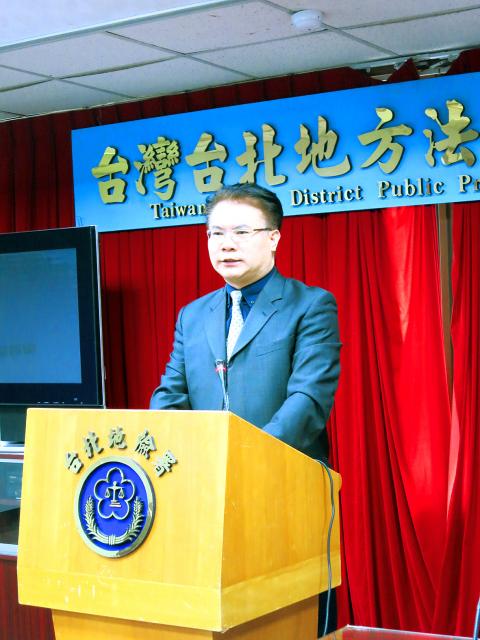The Taipei District Prosecutors’ Office yesterday reviewed data from the Ministry of Justice’s Bureau of Investigation (MJIB) concerning allegations that former Mainland Affairs Council (MAC) deputy minister Chang Hsien-yao (張顯耀) has been acting as a spy. The prosecutors agreed to take charge of an investigation of the matter, despite the same data being turned down by the Taiwan High Prosecutors’ Office on Thursday.
Taipei District Prosecutors started investigations into the case yesterday.
According to sources, Chang has been barred from leaving the country and prosecutors will subpoena him for questioning soon.

Photo: Chen Wei-tzum Taipei Times
The difference between the High Prosecutors’ Office prosecuting the case and the District Prosecutors’ Office prosecuting the case is criminal activity related to national security offenses if taken by the former, and meaning the alleged offense would exclude national security offenses if taken by the latter.
Chang has recently been in the spotlight over allegations that he had leaked sensitive information to Chinese officials.
According to sources, Chang had allegedly leaked five pieces of information on cross-strait economics and trade, as well as on the cross-strait trade services agreement.
The Mainland Affairs Council alleged that Chang divulged “confidential” and “secret” information.
Under the National Security Information Protection Act (國家安全機密保護法), restricted information is given three designations: top secret, secret and confidential.
The source also said Chang was suspected of having leaked information about Executive Yuan meetings, which may give a court cause to call Premier Jiang Yi-huah (江宜樺) to testify.
The prosecutors’ office said it suspected Chang had leaked the information by telling his alleged Chinese contact personally or by passing the contact notes, allowing the Chinese government to learn what Taiwan had brought to the negotiation table and where it would falter.
The bureau’s information showed Chang is suspected of conducting treasonous actions, which would usually place his alleged actions under the jurisdiction of the High Prosecutors’ Office, the District Prosecutors’ Office said.
However, it added that the High Prosecutors’ Office had declined to head the investigation, citing a lack of evidence that the information Chang allegedly leaked was affiliated with national security.
The High Prosecutors’ Office also said that if Chang is charged with dereliction of duty concerning foreign affairs, such charges are only applicable to foreign governments, while the government does not consider relations across the Taiwan Strait to be between nations, based on its “one China” policy.
Separately, lawyer Lin Chun-feng (林俊峰) said that the reason offenses infringing on external security of the nation were placed under the jurisdiction of the High Prosecutors’ Office was that national security matters merited immediate legal attention.
The High Prosecutors’ Office oversees all second trials, which means that once it headed the investigation and oversaw the indictment, the case would go straight through the second and third trials, Lin said.
The nation may have crumbled to the ground by the time the arduous legal processes from initial trial to the third trial are finished with, Lin said.
Additional reporting by CNA

MAKING WAVES: China’s maritime militia could become a nontraditional threat in war, clogging up shipping lanes to prevent US or Japanese intervention, a report said About 1,900 Chinese ships flying flags of convenience and fishing vessels that participated in China’s military exercises around Taiwan last month and in January last year have been listed for monitoring, Coast Guard Administration (CGA) Deputy Director-General Hsieh Ching-chin (謝慶欽) said yesterday. Following amendments to the Commercial Port Act (商港法) and the Law of Ships (船舶法) last month, the CGA can designate possible berthing areas or deny ports of call for vessels suspected of loitering around areas where undersea cables can be accessed, Oceans Affairs Council Minister Kuan Bi-ling (管碧玲) said. The list of suspected ships, originally 300, had risen to about

DAREDEVIL: Honnold said it had always been a dream of his to climb Taipei 101, while a Netflix producer said the skyscraper was ‘a real icon of this country’ US climber Alex Honnold yesterday took on Taiwan’s tallest building, becoming the first person to scale Taipei 101 without a rope, harness or safety net. Hundreds of spectators gathered at the base of the 101-story skyscraper to watch Honnold, 40, embark on his daredevil feat, which was also broadcast live on Netflix. Dressed in a red T-shirt and yellow custom-made climbing shoes, Honnold swiftly moved up the southeast face of the glass and steel building. At one point, he stepped onto a platform midway up to wave down at fans and onlookers who were taking photos. People watching from inside

Japan’s strategic alliance with the US would collapse if Tokyo were to turn away from a conflict in Taiwan, Japanese Prime Minister Sanae Takaichi said yesterday, but distanced herself from previous comments that suggested a possible military response in such an event. Takaichi expressed her latest views on a nationally broadcast TV program late on Monday, where an opposition party leader criticized her for igniting tensions with China with the earlier remarks. Ties between Japan and China have sunk to the worst level in years after Takaichi said in November that a hypothetical Chinese attack on Taiwan could bring about a Japanese

STREAMLINED: The dedicated funding would allow the US to transfer equipment to Taiwan when needed and order upgraded replacements for stockpiles, a source said The US House of Representatives on Thursday passed a defense appropriations bill totaling US$838.7 billion, of which US$1 billion is to be allocated to reinforcing security cooperation with Taiwan and US$150 million to replace defense articles provided to the nation. These are part of the Consolidated Appropriation Act, which the US House yesterday passed with 341 votes in favor and 88 against. The act must be passed by the US Senate before Friday next week to avoid another government shutdown. The US House Committee on Appropriations on Monday unveiled the act, saying that it allocates US$1 billion for the Taiwan Security Cooperation Initiative